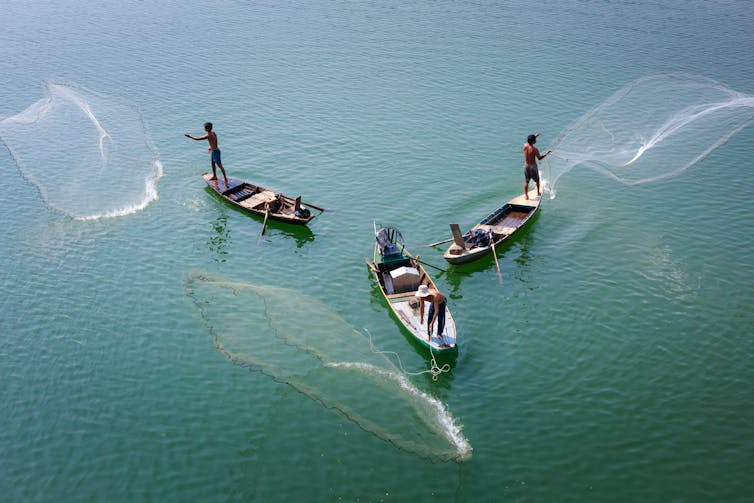Climate change is further reducing fish stocks
Stefanie Colombo, Dalhousie University and Aaron MacNeil, Dalhousie University
The health benefits of eating seafood are appreciated in many cultures which rely upon it to provide critical nutrients vital to our physical and mental development and health. Eating fish and shellfish provides significant benefits to neurological development and functioning and provides protection against the risks of coronary heart disease and Type 2 diabetes.
Over three billion people get at least 20 per cent of their daily animal protein from fish. In countries from Bangladesh to Cambodia, Gambia, Ghana, Indonesia, Sierra Leone and Sri Lanka, fish consumption accounts for 50 per cent or more of daily intake.
However, expansive growth of human populations globally puts immense pressure on the health of wild fish stocks. Fish catches peaked in 1996, and one-third are considered overexploited. With less fish available to still more people, the future of fish as an accessible source of nutritious food is at risk, particularly among low-income countries.
Seafood nutrient losses
Threats to seafood access aren’t just due to overharvesting. There is a growing body of research showing that higher water temperatures due to climate change can impact the presence and abundance of the catch, through shifts in species distribution and changes in the species caught. This impacts the amount that can be harvested, as well as the nutritional value of that harvest.
A new study (which Aaron MacNeil contributed to) quantified nutrient availability from seafood through time considering the twin impacts of overfishing and climate change.
Focusing on four key nutrients important to human health — calcium, iron, omega-3 fatty acids and protein — the authors argue that nutrient availability in seafood has been declining since 1990 and will further decline by around 30 per cent by 2100 in predominately tropical, low-income countries with 4 C of warming.
These predicted losses are significant. While global famines are now relatively rare, some 50 million people suffer from “hidden hunger” — nutrient-deficient diets that are masked by being otherwise calorie-sufficient.
For animal-derived nutrients such as B12 and omega-3 fatty acids, nearly 20 per cent of the global population are at risk of becoming nutrient-deficient in coming decades due to reliance on wild-caught fish.
Climate change is also affecting natural cycles of nutrients in the ocean. For example, it has been predicted that increasing water temperatures will cause a decline in natural omega-3 availability from seafood by more than 50 per cent by 2100. At the bottom of the food chain, microalgae that naturally produce omega-3s are less productive at warmer temperatures and this cascades through marine and freshwater food chains resulting in fish having less omega-3s available to eat and store in their bodies.

These kinds of climate-caused losses are expected to disproportionately affect vulnerable populations, especially in inland Africa.
Challenges and strategies for nutritious seafood
Aquaculture can help supply some of these missing nutrients, but it is an industry also vulnerable to the effects of climate change. A recent study predicted that 90 per cent of aquaculture will be impacted by climate change, where warm waters increase disease outbreaks, harmful algal blooms and impact the availability of feed supplies.
Global disparities already exist in food security that will be exacerbated by climate change in the future. Yet the effects of warming waters on nutrient availability from seafood will compound these inequities among tropical and low-income countries.
These results suggest a major challenge to our future nutritional security that demands strong fisheries and aquaculture management to facilitate equitable distribution of nutritious seafoods.
Improvements are possible.
For example, redirecting nine per cent of Namibia’s fisheries toward its coastal population would alleviate the severe iron deficiencies experienced there. Policies that prioritize nutrient supply would help maintain diets as the climate warms.
The recent United Nations call to action for blue transformation emphasizes the need to provide sufficient aquatic food from fisheries and aquaculture for our growing population in a sustainable way.
To do this, strategies are needed to achieve healthy, equitable and resilient food systems that adequately deal with overfishing, strive for equal access to resources and markets and mitigate the environmental impacts of aquatic food production.
Ultimately, these strategies must support the nutritional security of vulnerable nations and consider global health equity and the cultural significance of seafood.
Stefanie Colombo, Canada Research Chair in Aquaculture Nutrition, Dalhousie University and Aaron MacNeil, Professor, Department of Biology, Dalhousie University
This article is republished from The Conversation under a Creative Commons license. Read the original article.

